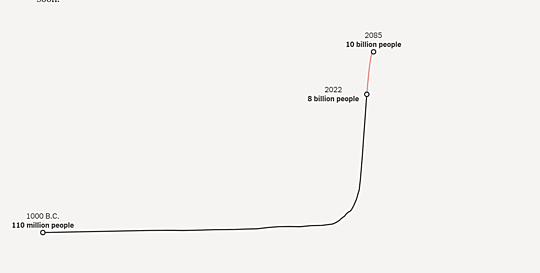#Wittgenstein Center for Demography and Global Human Capital
Explore tagged Tumblr posts
Text
Will the World’s Population Cease To Expand?
This blog has published many posts about the U.S. currently experiencing a declining and aging population and seeing one solution in encouraging immigration from other countries that have increasing and younger populations.[1] This perspective is complicated by some population experts seeing a future peak in world population and a subsequent shrinkage in same without reaching a plateau and stable…
View On WordPress
#China#Cuba. United States of America (USA)#Dean Spears (Population Research center University of Texas Austin#Institute for Health Metrics and Evaluation U|(University of Washington)#Professor Melissa Kearney (University of Maryland)#Russia#U.N. demographers#Wall Street Journal#Wittgenstein Center for Demography and Global Human Capital#world population
0 notes
Text

This is a troubling article by UT Austin economist Dan Spears on predictions that world population growth will peak sometime during the 2060s to 2080s, and then will rapidly decline. We all know on some level that human population growth cannot continue at this pace, but the sudden drop that experts predict in the near future is alarming--as are the predicted consequences of a rapid human population decline.
This is a gift 🎁 link that will enable anyone to read the full article, whether or not they subscribe to The New York Times. Here are some excerpts from this interactive article.

The global human population has been climbing for the past two centuries. But what is normal for all of us alive today—growing up while the world is growing rapidly—may be a blip in human history. Children born today will very likely live to see the end of global population growth.A baby born this year will be 60 in the 2080s, when demographers at the U.N. expect the size of humanity to peak. The Wittgenstein Center for Demography and Global Human Capital in Vienna places the peak in the 2070s. The Institute for Health Metrics and Evaluation at the University of Washington puts it in the 2060s. All of the predictions agree on one thing: We peak soon.

And then we shrink. Humanity will not reach a plateau and then stabilize. It will begin an unprecedented decline. Because most demographers look ahead only to 2100, there is no consensus on exactly how quickly populations will fall after that. Over the past 100 years, the global population quadrupled, from two billion to eight billion. As long as life continues as it has — with people choosing smaller family sizes, as is now common in most of the world — then in the 22nd or 23rd century, our decline could be just as steep as our rise.
The article goes on to say:
[...] What would happen as a consequence [of a rapid decline in human population]? Over the past 200 years, humanity’s population growth has gone hand in hand with profound advances in living standards and health: longer lives, healthier children, better education, shorter workweeks and many more improvements. Our period of progress began recently, bringing the discovery of antibiotics, the invention of electric lightbulbs, video calls with Grandma and the possibility of eradicating Guinea worm disease. In this short period, humanity has been large and growing. Economists who study growth and progress don’t think this is a coincidence. Innovations and discoveries are made by people. In a world with fewer people in it, the loss of so much human potential may threaten humanity’s continued path toward better lives.
I encourage you to read the rest of this article. Whether or not one agrees with Dr. Spears's arguments, they are thought provoking.
[edited]
____________________ Sara Chodosh created the graphics in the article, which were used to create the above gifs.
#world human population growth#rapid population decline#dan spears#sara chodosh#interactive article#gift link#the new york times#my edits#my gifs
57 notes
·
View notes
Text
After Economic Crisis, Low Birthrates Challenge Southern Europe
By Liz Alderman, NY Times, April 16, 2017
ATHENS--As a longtime fertility doctor, Minas Mastrominas has helped couples in Greece give birth to thousands of bouncing babies. But recently, disturbing trends have escalated at his clinic.
Couples insisting on only one child. Women tearfully renouncing plans to conceive. And a surge in single-child parents asking him to destroy all of their remaining embryos.
“People are saying they can’t afford more than one child, or any at all,” Dr. Mastrominas, a director at Embryogenesis, a large in vitro fertilization center, said as videos of gurgling toddlers played in the waiting room. “After eight years of economic stagnation, they’re giving up on their dreams.”
Like women in the United States and other mature economies, women across Europe have been having fewer children for decades. But demographers are warning of a new hot spot for childlessness on the Mediterranean rim, where Europe’s economic crisis hit hardest.
As couples grapple with a longer-than-expected stretch of low growth, high unemployment, precarious jobs and financial strain, they are increasingly deciding to have just one child--or none.
Approximately a fifth of women born in the 1970s are likely to remain childless in Greece, Spain and Italy, a level not seen since World War I, according to the Wittgenstein Center for Demography and Global Human Capital, based in Vienna. And hundreds of thousands of fertile young people have left for Germany, Britain and the prosperous north, with little intent of returning unless the economy improves.
Birthrates in the region have slid back almost to where they were before the crisis emerged in 2008. Women in Spain had been averaging 1.47 children per household, up from 1.24 in 2000. But those gains have all but evaporated. In Italy, Portugal and Greece, birthrates have reverted to about 1.3.
It adds to the growing concern about a demographic disaster in the region. The current birthrates are well under the 2.1 rate needed to keep a population steady, according to Eurostat.
Whether the demographic decline slows ultimately depends on the financial fortunes in the south, where most countries suffered double-dip recessions. Without significant improvement, the region is trending toward some of the lowest birthrates in the world, which will accelerate stress on pension and welfare systems and crimp growth as a shrinking work force competes with the rest of Europe and the world.
While dwindling populations threaten all of Europe, “the really serious problem is that some of the weakest countries are the ones with the least favorable demographics,” said Simon Tilford, the deputy director of the Center for European Reform in London. “Lower birthrates in the south will mean weaker growth and productivity, holding the birthrate down and producing more fiscal problems.”
Over time, he added, “it suggests that the already divergent economic performance between Northern and Southern Europe may become structural rather than cyclical.”
The lower birthrates have been aggravated by fiscal pressures that constrained countries from offering robust family support programs. Whereas France offers a monthly family benefit of 130 euros (about $138) per child after the second child, Greece provides just 40 euros.
Countries have recognized the problem and recently snapped into action. Spain appointed a so-called sex czar in February to forge a national fertility action plan and address population declines in rural areas. Italy increased bonuses for having babies and backed labor laws granting more flexible parental leave.
Greece, as the weakest economic link, does not have the same options. Greece now has the lowest budget in the European Union for family and child benefits.
Grandparents have traditionally been the primary source of child care in the south, but Greek austerity policies have reduced pensions so much that the family safety net is unraveling, said Dimitrios Karellas, the general secretary of the Labor and Social Welfare Ministry in Greece.
“We need to allocate more money to create the services needed for families and children,” Mr. Karellas said. “But it’s hard to do amid the crisis.”
Demographic challenges are not confined to Southern Europe. Germany has battled a population drop since the 1970s, when higher education and new career opportunities for women lowered fertility rates. After Communism, birthrates in Central and Eastern Europe also fell.
In the new millennium, an economic expansion helped reverse those dynamics. But the financial crisis “hit Europe when birthrates in many countries had just started to rise again,” said Michaela Kreyenfeld of the Max Planck Institute for Demographic Research in Rostock, Germany.
The impact is evident in communities across the European south, where smaller towns are increasingly hollowed out and schools emptied.
In Tempi, a verdant region in central Greece, many primary schools and kindergartens have closed since 2012 as parents had fewer children and young Greeks left the country, said Xanthi Zisaki, a municipal councilor. Kindergarten enrollment has also slumped elsewhere in Greece and around Spain and Italy.
While migration from small towns is nothing new, “the financial crisis is clearly the problem,” Mrs. Zisaki said. “There are simply fewer children every year.”
“If we don’t fix this, in 20 years we’ll be a country of old people,” said Mr. Karellas, the welfare official. “The fact is, it’s a disaster.”
0 notes
Text
Will the World’s Population Cease To Expand?
This blog has published many posts about the U.S. currently experiencing a declining and aging population and seeing one solution in encouraging immigration from other countries that have increasing and younger populations.[1] This perspective is complicated by some population experts seeing a future peak in world population and a subsequent shrinkage in same without reaching a plateau and stable…
View On WordPress
#China#Dean Spears#Institute for Health Metrics and Evaluation U|(University of Washington)#Population Research Center at the University of Texas (Austin)#Professor Melissa Kearney (University of Maryland)#Russia#U.N. demographers#United States of America#Wall Street Journal#Wittgenstein Center for Demography and Global Human Capital#world population
0 notes